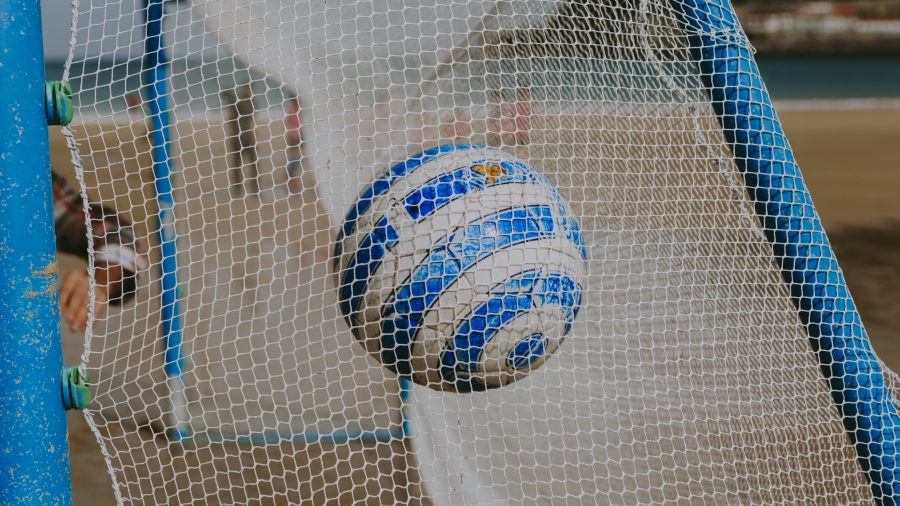
- Under the slogan 'We take the risk for our seas', Real Sociedad’s project is rescuing abandoned nets from the water to transform them into football goal nets.
- For the club and its foundation, this circular economy project is another step forward in the sustainability and environmental care strategy, while it has even been nominated as a candidate in the sustainability category at the Leaders Sports Awards.
640,000 tonnes of fishing nets end up on the bottom of the oceans every year, which has a negative impact on the seabed and marine fauna. Given the geographical location of Real Sociedad and the tradition of the fishing sector around the Gipuzkoa club, the Real Sociedad Foundation launched what is called the Sareak (the word for “Nets”, in Basque) project.
The initiative, which has the slogan 'We take the risk for our seas', is being carried out with the collaboration of Real Sociedad's underwater activities section. It is a circular economy project that sees abandoned nets rescued from the bottom of the sea and from the ports of Gipuzkoa, recycled and turned into football goal nets.
Sareak has been developed alongside the creative agency and production company Phantalassa, which specialises in projects related to the sea. As Andoni Iraola, director of the Real Sociedad Foundation, explained: “They presented us with the initial idea, which captivated us from the start. The fact that this linked the sea, the traditional rederas trade and the iconic football matches held on La Concha Beach (a famous beach in the city of San Sebastián) meant that we couldn't say no to the idea.”
This is how the Sareak project started, with it based on a unique methodology that is divided into three phases. In the first phase, the 'Rescue' phase, all efforts are focused on locating the nets, identifying them and planning the dives to collect them.
In the second phase, the 'Conversion' phase, the nets need to be transformed after being collected. This is where the rederas play a special role. This profession, one focused on crafting fishing materials by hand, has been a pillar of the Basque economy for more than 10 centuries, forming an essential part of the history and culture of the Basque Country. For the Real Sociedad Foundation, one of the most important aspects of the Sareak project has been giving these women work and lending visibility to the profession, which is so deeply rooted in the culture of the region. “They represent so many of the values that Real Sociedad is so proud of,” Iraola said.
Once the nets have been woven and prepared by the rederas, and after dyeing them white, it’s time for the last phase, the 'Delivery' phase. This is where the nets are set up for use by the boys and girls who regularly play football on La Concha Beach.
This whole project goes far beyond what it means on the surface, as it has also allowed the club to establish a close relationship with various people and organisations in the region, such as the rederas themselves, as well as research centres, oceanographic foundations, universities and other entities linked to the marine world and the circular economy.
Iraola added: “The cross-disciplinary nature of the project has meant that several of the club's departments have participated in it. All of this has allowed us to transmit a message of awareness and sustainability to the outside world, but also to our internal world, and that is important.”
As well as delivering the nets, a lot of informative material has been put together to accompany the project and to raise awareness in young people and in adults about the need to take care of the seas and seabed. Audiovisual material has also been produced to create a mobile exhibition, which has already been installed for two matches held at the Reale Arena.
The Sareak project is only three years old, but it has already made a significant impact and, after designing the process and seeing its viability, two concrete objectives have been set. The first is to manufacture enough nets for the 13 football pitches that are on La Concha Beach. The second objective is to expand the project and continue recycling these nets to give them a second life with different destinations, even beyond the football pitches.
The project has had such an impact that it has even been nominated as a candidate for the Leaders Sports Awards in the sustainability category. This prestigious award considered the Real Sociedad Foundation’s project as one of the five most interesting in the environmental care section.
Sustainability is a fundamental issue at the club
As well as this Sareak project, sustainability is a fundamental element for the club as a whole and is considered in many of the club's decisions, from initiatives related to new infrastructures to a sustainable transport plan to awareness-raising projects that have a direct impact on those around Real Sociedad.
Among the various campaigns to have been developed in recent years, one interesting example was the Reale Arenatik Gipuzkoako baratzetara (meaning “From the Reale Arena to the Gardens of Gipuzkoa”). In the 2019/20 season, the club collected 1,900 kilos of shells from the seeds consumed in the stands of the Reale Arena during matches. After almost a year of ripening, they had been turned into quality compost that could fertilise the vegetable gardens of the Kutxa Fundazioa park.
Because of the success of that initiative, the club decided to expand the project around Gipuzkoa, taking the compost from these shells to vegetable gardens in six different municipalities.
Another notable project was the one carried out by the club during the pandemic, in which it gave 350 bags to the San Sebastián College of Doctors and Nurses, with these made from the canvases that were in the stadium during the pandemic. These canvases had been placed in the Reale Arena when the fans couldn’t go and cheer on the team due to the pandemic, with banners placed around the ground instead to represent the fans and other groups. Once the supporters could return to the stadium, this material was recycled, which was another way in which the Real Sociedad Foundation advanced its circular economy strategy.
